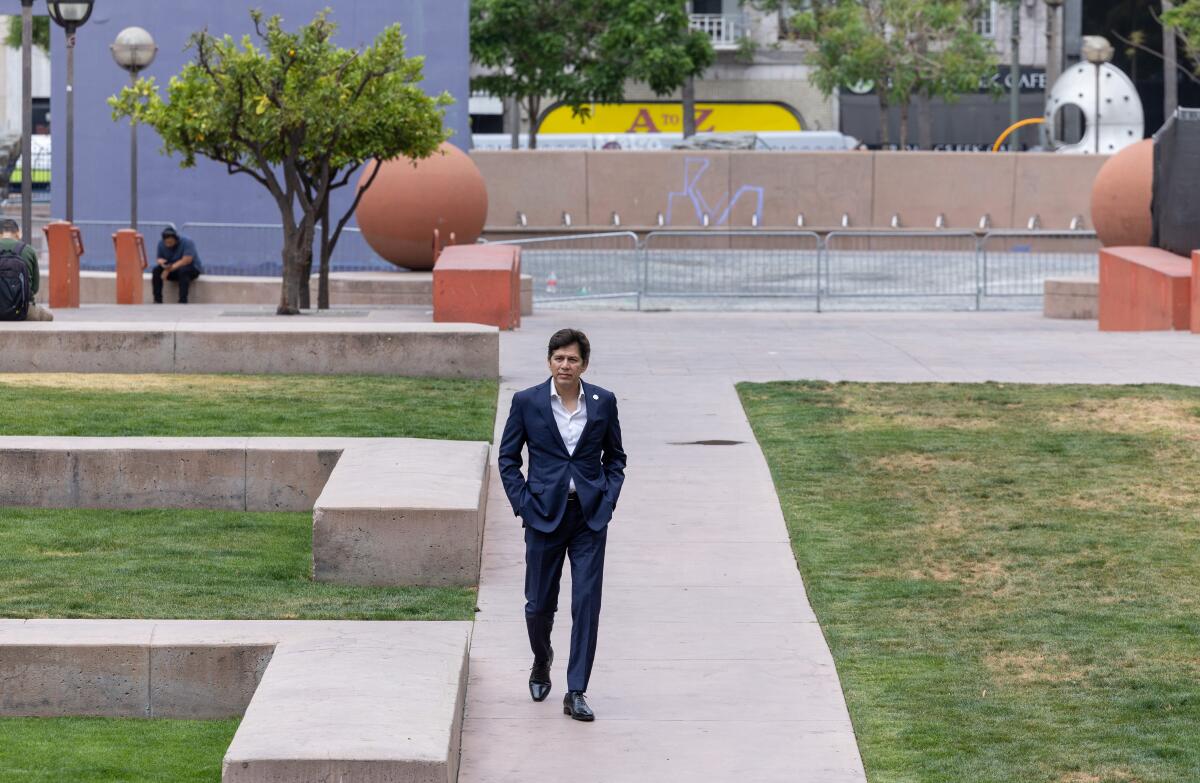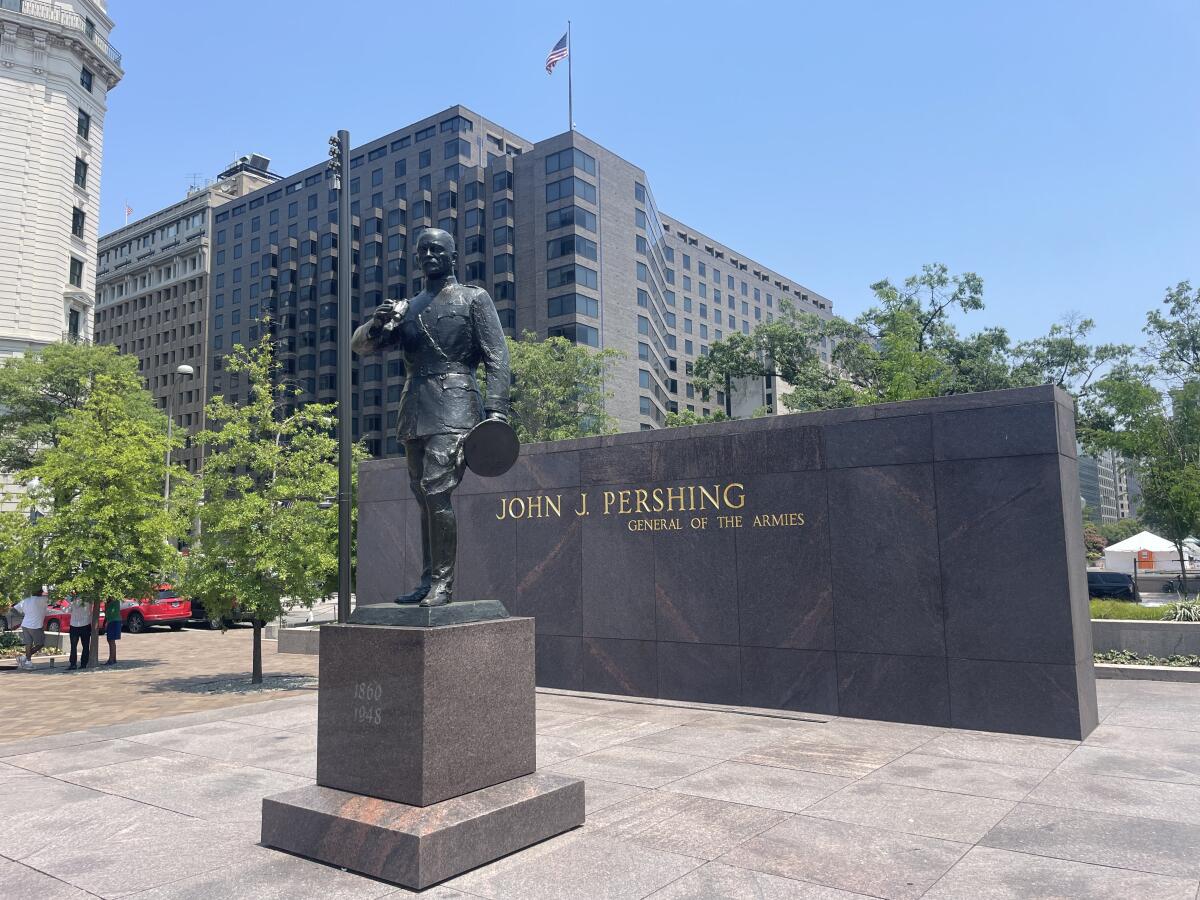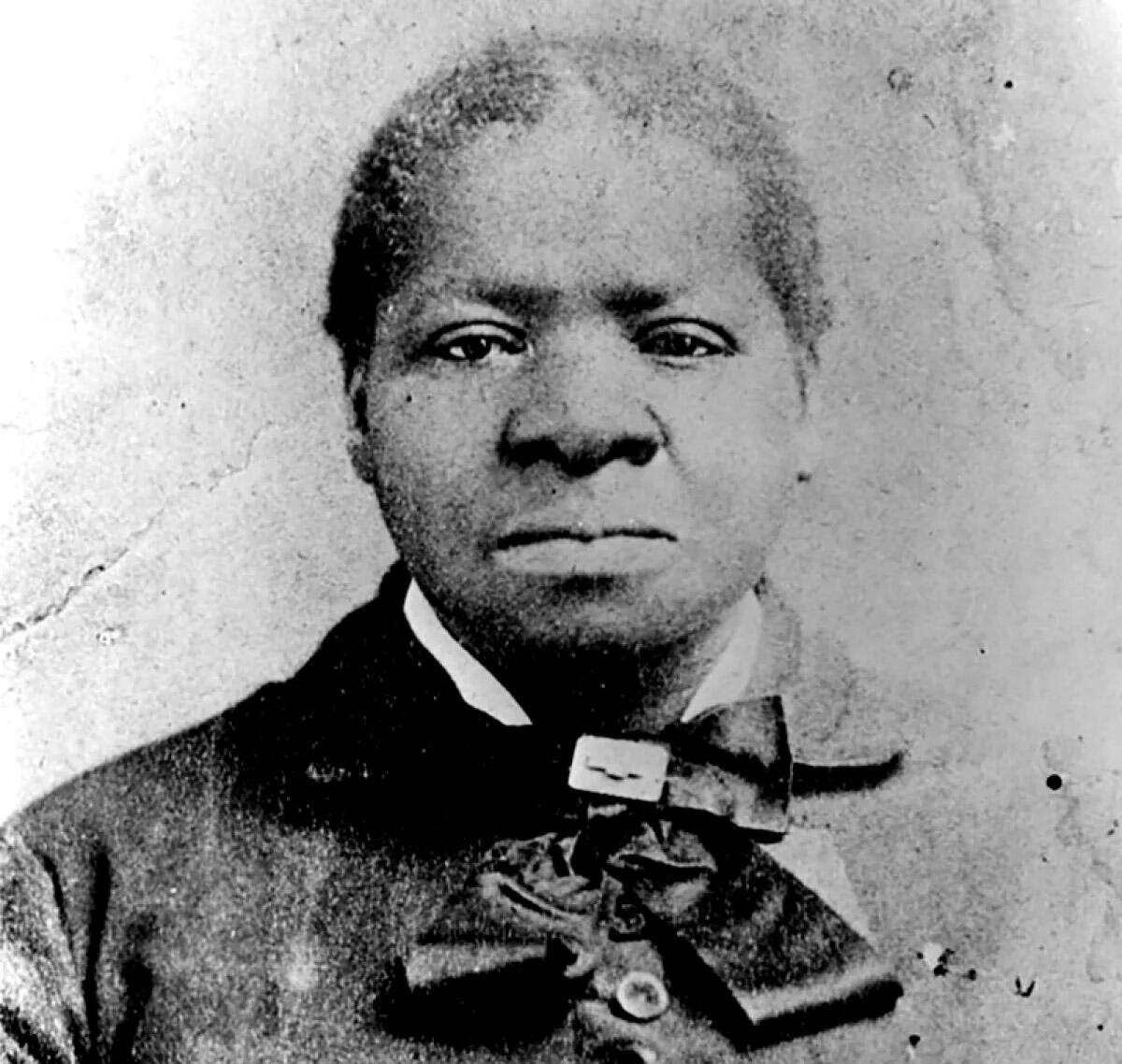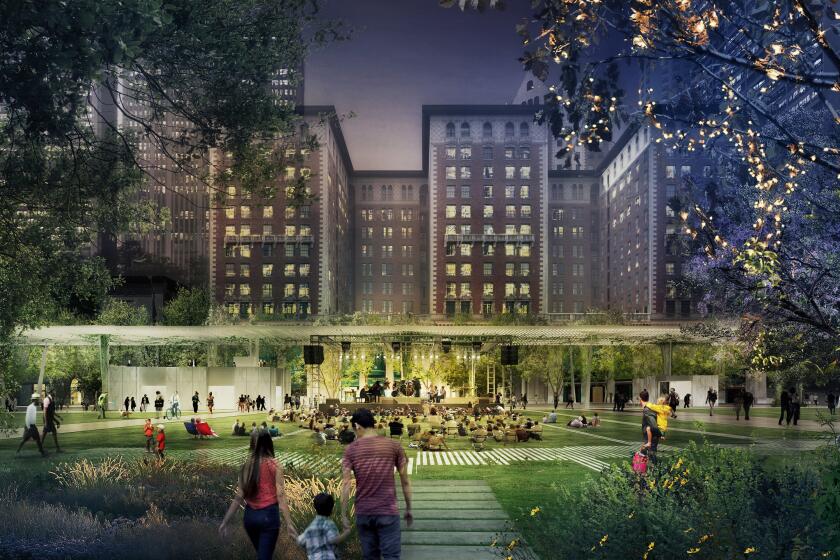Column: Is Kevin de León’s push to honor Black L.A. history heartfelt, or cynical?

I really didn’t want to write about the latest Kevin de León move but Gen. John J. Pershing made me.
Or rather, his statue in Washington, D.C.
It stands at the National World War I Memorial, a 1.75-acre park just to the southeast of the White House. Cap in one hand and binoculars in another, the American icon looks out to a fountain, maps and inscriptions that tell the story of the Great War. Behind him is a wall with his name and rank: General of the Armies, an honor no other living U.S. general has held and bestowed posthumously on George Washington and Ulysses S. Grant.
The muted memorial was empty when I accidentally walked by it this past Saturday afternoon on the way back to my hotel after a conference. It was smaller and emptier than L.A.’s homage to the general: downtown’s Pershing Square, which the City Council voted to rename from Central Park in 1918 and which critics have long pilloried as an underachieving lump of public space.
I’m not the biggest war nerd, but Pershing was on my mind thanks to De León, who faces a tough City Council reelection campaign because of his role in the City Hall tape leak scandal that upended L.A. politics nearly two years ago. As reported last week by my colleagues Ruben Vives and David Zahniser, the embattled Eastsider wants to rechristen Pershing Square — which is in his district — after Biddy Mason as part of its long-delayed, multimillion-dollar renovation.
L.A. Councilmember Kevin de León will propose the renaming of Pershing Square after Biddy Mason, a little-known L.A. philanthropist who started her life in slavery.
I’m actually surprised the five-acre park has kept Pershing’s name this long. Although “Black Jack” led our country to victory in World War I, his resume is chockablock with cancel-culture no-nos. He participated in the Indian Wars and the brutal occupation of the Philippines after the Spanish-American War, and enforced segregation in the U.S. armed forces during World War I even though he had commanded Black soldiers in the American West. Pershing also infamously invaded Mexico in a futile search for Pancho Villa, a failure Mexicans still ridicule more than a century after it happened.
Mason, meanwhile, is one of the most inspiring reinvention stories in a city where it’s an art: an ex-slave turned downtown landowner, philanthropist, midwife and co-founder of L.A.’s First African Methodist Episcopal Church. A timeline of her life and an image of her stand at Biddy Mason Memorial Park, a long concrete wall off Spring Street between Third and Fourth streets located roughly in the middle of what was the original Mason homestead. But not enough Angelenos know about her.
De León told The Times he’s been in conversation with Mason’s descendants since early 2022 about how to publicly honor their matriarch, and swears his plans have nothing to do with his City Council race. “Cynical eyes will always be around,” he told The Times. “You can’t change cynical.”
But it’s hard not to think of political cynicism since De León’s starring role in the tape leak scandal that roiled City Hall and L.A.

Even before joining the council in 2020, De León marked himself as a politician whose naked ambition and yearning for public adulation was part Jay Gatsby, part Donald Trump. De León has only reinforced that perception in the aftermath of the leak, which he treats as if it were a blip on his career. He refused to resign despite calls coming from the streets to the White House and has used hundreds of thousands of public dollars to send mailers to constituents that are ostensibly about city services but just happen to bear his name. Nevertheless, he and ex-Councilmember Gil Cedillo (who was also heard on the tape, along with ex-council President Nury Martinez and former Los Angeles County Federation of Labor head Ron Herrera) are still pursuing a lawsuit against a couple they allege illegally recorded the conversation, claiming irredeemable harm to their reputations.
De León wasn’t known for trumpeting Black issues or history during his time in Sacramento, his failed 2018 U.S. Senate campaign, or his first two years on the City Council — unsurprising, since his constituents have always been overwhelmingly Latino. But now we’re supposed to believe that De León wants to be a champion for a long-overlooked pioneer of Black L.A. out of the goodness of his heart? As a reminder, the tape torpedoed his career because it captured him mocking Black political power as a Wizard of Oz-like mirage, accusing former Councilmember Mike Bonin of flashing his Black son in public appearances like a luxury handbag, and not uttering a peep as Martinez called the child a negrito and compared him to a little monkey.
His move to honor Mason, while ultimately righteous, comes off as politically manipulative. And it’s not just me: First AME Church Pastor Robert R. Shaw, II was supposed to join the Juneteenth news conference at Pershing Square where De León announced his renaming plans but pulled out, posting on Instagram that he felt “there are ulterior motives that conflict with my values” while nevertheless offering his support to the main cause.
It would seem to be just in the right place for a city park: a five-acre square in the heart of downtown Los Angeles, bounded by Olive, Hill, 5th and 6th streets, with the elegant front of the Biltmore Hotel on one side, the busy office towers of Bunker Hill on another, and the lofts, restaurants and nightlife of our newly vibrant urban core on the others.
It’s the second time in less than a year that De León has joined in the commemoration of a Black L.A. legend. In September, he was at the dedication of Willis O. Tyler Square at the intersection of 2nd and Spring Streets, just a block away from Mason’s homestead. Tyler was an attorney who unsuccessfully represented a Black family whose beachfront property in Manhattan Beach was taken away from them in the 1920s. That same stretch of land is known today as Bruce’s Beach, which made headlines after the County of Los Angeles returned it to the descendants of the original owners in 2022 (they, in turn, sold it back to the county last year).
“Even when we fall off track from our values and principles as a society, or even as individuals,” De León said during the naming ceremony, “heroes like Willis O. Tyler help redirect us, help center us, help put us back on the track to adhering to the values that make us stronger as a society and better individuals.”

Perhaps De León has truly atoned and I’m being too cynical. I’d love to talk to him about his recent interest in the history of Black L.A., but he and his staff have consistently declined my interview requests for reasons known only to them. So when I returned home from D.C. on Sunday afternoon, I walked around Pershing Square before the Los Angeles Press Club awards banquet across the street at the Biltmore for some perspective.
The steps leading in smelled of urine. An MS-13 tag desecrated the base of a doughboy statue erected 100 years ago this Fourth of July. One of the three plaques originally dedicated to Pershing was missing from a pillar. Young people and families still gamely tried to make a pleasant afternoon of it.
The general’s most famous quote from his 1931 memoirs ran through my mind: “A competent leader can get efficient service from poor troops, while on the contrary an incapable leader can demoralize the best of troops.”
De León seems to be daring critics to oppose his Biddy Mason measure. Well, he’s just the type of politician whose feel-good measure any reasonable person would want to oppose.
More to Read
Sign up for Essential California
The most important California stories and recommendations in your inbox every morning.
You may occasionally receive promotional content from the Los Angeles Times.











